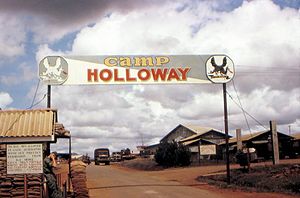Attack on Camp Holloway
| Attack on Camp Holloway | |||||||
|---|---|---|---|---|---|---|---|
| Part of Vietnam War | |||||||
 Camp Holloway was attacked by the Viet Cong on 7 February 1965, which led to the further escalation of the Vietnam War. |
|||||||
|
|||||||
| Belligerents | |||||||
|
|
|
||||||
| Commanders and leaders | |||||||
|
|
|
||||||
| Units involved | |||||||
| 30th Company, 409th Battalion | 52nd Combat Aviation Battalion | ||||||
| Strength | |||||||
| 300 | 400 | ||||||
| Casualties and losses | |||||||
| Probably 1. (Raid lasted 5 minutes). | 9 killed 126 wounded 10 aircraft destroyed 15 aircraft damaged |
||||||
The attack on Camp Holloway occurred during the early hours of February 7, 1965, in the early stages of the Vietnam War. Camp Holloway was a helicopter facility constructed by the United States Army near Pleiku in 1962. It was built to support the operations of Free World Military Forces in the Central Highlands of Vietnam.
In August 1964, the United States Navy reported they were attacked by torpedo boats of the North Vietnamese Navy in what became known as the Tonkin Gulf Incident. In response to the perceived aggression of Communist forces in Southeast Asia, the United States Congress passed the Tonkin Gulf Resolution which enabled U.S. President Lyndon B. Johnson to deploy conventional military forces in the region to prevent further attacks by the North Vietnamese. Immediately after the Tonkin Gulf Resolution was passed, Johnson ordered the bombing of North Vietnamese Navy bases in retaliation for the reported attacks on U.S. Navy warships between 2 and 4 August 1964. However, the Viet Cong forces in South Vietnam were not deterred by the threat of U.S. retaliation.
Throughout 1964, the Viet Cong launched several attacks on U.S. military facilities in South Vietnam but Johnson did not start further retaliations against North Vietnam, as he tried to avoid upsetting U.S. public opinion during the 1964 United States Presidential Election. The Soviet Union, on the other hand, were experiencing political changes of their own as Nikita Khrushchev was removed from power. As leader of the Soviet Union, Khrushchev had begun the process of disengagement from Vietnam by reducing economic and military aid to North Vietnam. However, in the aftermath of Khrushchev's downfall, the Soviet government had to redefine their role in Southeast Asia, particularly in Vietnam, to compete with the growing influence of the People's Republic of China.
...
Wikipedia
